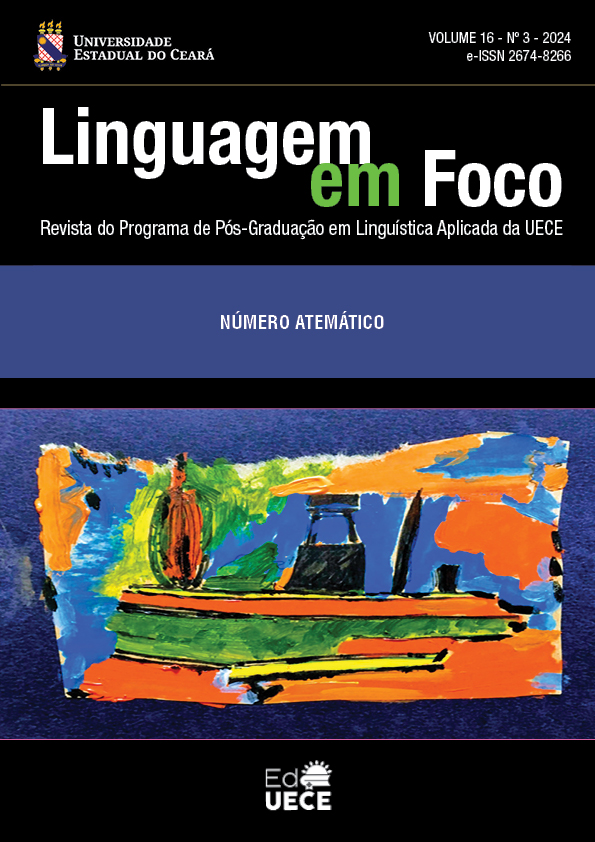Recategorização e orientação argumentativa
uma análise da introdução referencial em redações nota mil do ENEM
DOI:
https://doi.org/10.46230/lef.v16i3.13530Palabras clave:
Introdução ReferencialResumen
Considerando que os textos são produzidos para cumprir determinado(s) propósito(s) comunicativo(s) e que são orientados para esse fim, defendemos haver textos com argumentação direta e textos com argumentação indireta, o que implica falar em graus de argumentatividade (Cavalcante et al, 2020), pressuposto defendido pela Linguística Textual. Resultante de uma pesquisa de dissertação, neste artigo, objetivamos analisar a atuação da introdução referencial no desenvolvimento da orientação argumentativa em redações nota mil do ENEM ano 2018. Com respaldo em Amossy (2018) e Silva (2013), mediante abordagem qualitativa, de natureza exploratória e do tipo descritivo-interpretativista, a pesquisa reforça a argumentatividade presente já na inauguração dos referentes, revelando pontos de vista e avaliações que constroem e reforçam uma tese. Para análise, elegemos 2 redações, as quais apresentam maior recorrência de processos referenciais e similaridade quanto ao viés argumentativo de discussão. Como resultados, concluímos que, da função de caracterizar o referente a de encapsular um projeto de dizer que ainda será desenvolvido ao longo da unidade discursiva, a introdução referencial trabalha na construção da orientação argumentativa do texto cumprindo o papel de articulador, dado que a inauguração de um referente resulta uma posterior retomada ou remissão e conduz o leitor a pensar o tema sob determinadas percepções. Com efeito, reconhecemos os efeitos que esta pesquisa traz às aulas de Língua Portuguesa, quanto às funções que a construção da referência cumpre à orientação argumentativa dos textos, à medida que agencia a ampliação dos estudos sobre a interface entre referenciação e argumentação em Linguística Textual.
Descargas
Citas
ADAM, J. M. A Linguística Textual: introdução à análise textual dos discursos. 2. ed. Revista e aumentada. São Paulo: Cortez, 2011.
AMOSSY, R. A argumentação no discurso. Tradução de Angela M. S. Corrêa [et al.]. São Paulo: Contexto, 2018.
CAVALCANTE, M. M.; CARVALHO, A. P. L.; SILVA, A. A.; DUARTE, A. L. M.; PINHEIRO, C. E. S.; LIMA, I. M.; FERNANDES, J. O.; BARROS, J. M.; SOARES, M. S.; FARIA, M. G. S.; BRITO, M. A. P.; MARTINS, M. A.; MACEDO, P. S. A.; OLIVEIRA, R. L.; PINTO, R.; CORTEZ, S. L.; CUSTÓDIO FILHO, V. Linguística Textual e Argumentação. 1. ed. Campinas, SP: Pontes editores, 2020.
CAVALCANTE, M. M. Abordagens da argumentação nos estudos de Linguística Textual. ReVEL, edição especial, v. 14, n. 12, p. 106-124, 2016. Disponível em: https://www.revel.inf.br/files/ea45a0fb01f8dde37a9435628505a55d.pdf. Acesso em: 15 maio 2024.
CAVALCANTE, M. M.; CUSTÓDIO FILHO, V.; BRITO, M. A. P. Coerência, referenciação e ensino. 1. ed. São Paulo: Cortez, 2014.
CAVALCANTE, M. M. Os sentidos do texto. São Paulo: Contexto, 2012.
CAVALCANTE, M. M. Referenciação: sobre coisas ditas e não ditas. Fortaleza: Edições UFC, 2011.
CAVALCANTE, M. M; CUSTÓDIO FILHO, V. Revisitando o estatuto do texto. Revista do GELNE, Piauí, v. 12, n. 2, p. 56-71, 2010. Disponível em: https://repositorio.ufc.br/bitstream/riufc/26452/1/2010_art_mmcavalcante.pdf. Acesso em: 20 maio 2024.
KOCH, I. G.; ELIAS, V. M. Escrever e argumentar. 1. ed. São Paulo: Contexto, 2018.
KOCH, I. G. Argumentação e linguagem. 13. ed. São Paulo: Cortez, 2011.
MACHADO, D. Z. Referenciação. In: COSTA, I. B.; FOLTRAN, M. J. (orgs.). A tessitura da escrita. São Paulo: Editora Contexto, 2013. p. 101-123.
MATOS, J. G. As redes referenciais na construção de notas jornalísticas. 2018. 259f. Tese (Doutorado em Linguística). Programa de Pós-Graduação em Linguística. Universidade Federal do Ceará: Fortaleza, 2018. Disponível em: https://repositorio.ufc.br/bitstream/riufc/35419/5/2018_tese_jgmatos.pdf. Acesso em: 27 abr. 2024.
PRADO, D. de F.; MORATO, R. A. A redação do ENEM como gênero textual-discursivo: uma breve reflexão. Cadernos CESPUC De Pesquisa Série Ensaios, v. 29, p. 205-219, 2017. Disponivel em: https://doi.org/10.5752/P.2358-3231.n29p205-219. Acesso em 16 dez. 2024.
SILVA, F. O. Formas e funções das introduções referenciais. 2013. 126f. Tese (Doutorado em Linguística). Programa de Pós-Graduação em Linguística. Universidade Federal do Ceará: Fortaleza, 2013. Disponível em: https://repositorio.ufc.br/bitstream/riufc/8247/1/2013_tese_fosilva.pdf. Acesso em: 29 abr. 2024.
SILVA, F. O.; CUSTÓDIO FILHO, V. O caráter não linear da recategorização referencial. In: CAVALCANTE, M. M.; LIMA, S. M. C. (orgs.). Referenciação: teoria e prática. São Paulo: Cortez, 2013. p. 59-85.
SOARES, M. S. Processos referenciais por nome próprio como estratégias argumentativas. 2018. 119f. - Dissertação (Mestrado) - Universidade Federal do Ceará, Programa de Pós-graduação em Linguística, Fortaleza (CE), 2018. Disponível em: https://repositorio.ufc.br/handle/riufc/33104. Acesso em: 16 dez. 2024.
TRAVAGLIA, L. C. Fatos pertinentes para o trabalho com a tipologia textual no ensino de língua. In: MARQUESI, S. C.; PAULIUKONIS, A. L.; ELIAS, V. M. (orgs.). Linguística Textual e ensino. São Paulo: Contexto, 2017. p. 69-89.
Descargas
Publicado
Cómo citar
Número
Sección
Licencia
Derechos de autor 2025 Amanda Mikaelly Nobre de Souza, Lidiane de Morais Diógenes Bezerra

Esta obra está bajo una licencia internacional Creative Commons Atribución 4.0.
Os autores que publicam na Linguagem em Foco concordam com os seguintes termos:
- Os autores mantêm os direitos autorais e concedem à revista o direito de primeira publicação. Os artigos estão simultaneamente licenciados sob a Creative Commons Attribution License que permite a partilha do trabalho com reconhecimento da sua autoria e da publicação inicial nesta revista.
- Os conceitos emitidos em artigos assinados são de absoluta e exclusiva responsabilidade de seus autores. Para tanto, solicitamos uma Declaração de Direito Autoral, que deve ser submetido junto ao manuscrito como Documento Suplementar.
- Os autores têm autorização para disponibilizar a versão do texto publicada na Linguagem em Foco em repositórios institucionais ou outras plataformas de distribuição de trabalhos acadêmicos (ex. ResearchGate, Academia.edu).





























